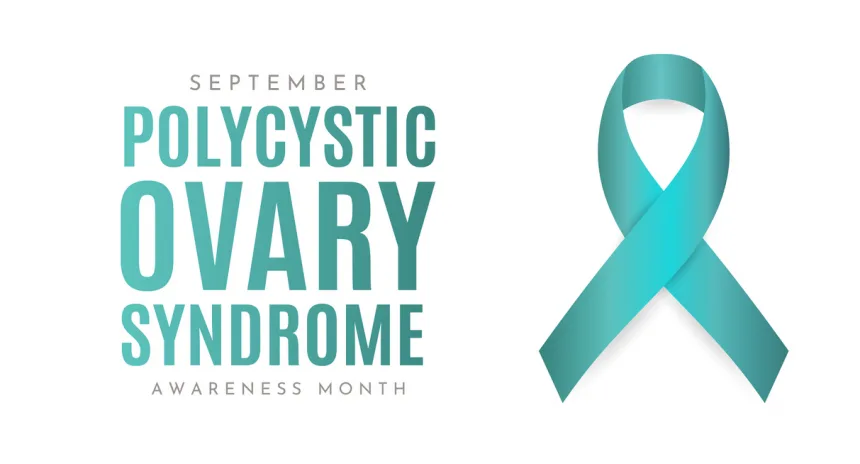September 1 marks the beginning of PCOS Awareness Month, a crucial global initiative addressing Polycystic Ovary Syndrome (PCOS) – one of the most prevalent yet frequently misunderstood hormonal disorders affecting women worldwide. Current research indicates PCOS affects approximately 3-4 out of 10 women globally, with studies in India showing particularly high prevalence rates ranging from 3.7% to 22.5%. The condition primarily affects women during their prime reproductive years, typically between ages 15 and 44, significantly impact future fertility.
At its core, PCOS represents a profound hormonal imbalance that disrupts normal ovarian function, leading to the development of multiple immature follicles that appear as small cysts on ultrasound examination leading to multifaceted challenges to conceive naturally, potentially leading to infertility. But this condition is far more than a reproductive issue—it’s a full-body metabolic disorder with cascading effects on fertility, physical health, and emotional well-being.
While genetics lay the groundwork, the dramatic rise in PCOS cases reveals how profoundly modern lifestyles are contributing. Our shift toward processed foods, increasingly sedentary habits, disrupted sleep patterns, constant digital stimulation, and unrelenting stress from academic, professional, and social pressures have collectively thrown women’s metabolic systems into disarray. These lifestyle factors converge to create two central problems: excess weight, particularly dangerous visceral fat around the abdomen, and insulin resistance, where the body’s cells stop responding properly to insulin.
This insulin resistance triggers a destructive cycle. As cells become less responsive, the pancreas works overtime, flooding the bloodstream with excess insulin. This insulin overload then wreaks havoc in multiple ways. It drives up production of androgens (often called male hormones), leading to frustrating symptoms like acne, unwanted facial and body hair, and hair thinning on the scalp. It disrupts normal ovulation, causing irregular or absent menstrual periods. Perhaps most alarmingly, it significantly increases the risk of developing type 2 diabetes later in life.
The physical symptoms tell only part of the story. PCOS exacts a heavy psychological toll that often goes unrecognized. Women with PCOS report higher rates of anxiety, depression, and social withdrawal, compounded by the embarrassment and stigma surrounding visible symptoms like weight gain and excessive hair growth. Many also struggle with “brain fog”—a frustrating combination of poor concentration, memory lapses, and persistent fatigue that can undermine both professional and personal life. Tragically, despite these well-documented challenges, mental health support specifically addressing PCOS-related issues remains woefully inadequate, leaving many women to suffer in isolation.
Diagnosing PCOS through authorized medical practioners involves looking for three key features: irregular menstrual cycles, signs of excess androgen (either through symptoms or blood tests), and the characteristic polycystic appearance of ovaries on ultrasound examination. Once identified, effective management requires a comprehensive approach under the guidance of a medical professionals and professional dietician.
Nutrition plays a crucial role—a diet focused on whole foods with low glycemic impact can help combat insulin resistance. Regular physical activity, ideally 150 minutes per week of moderate exercise like brisk walking or swimming, has been shown to improve insulin sensitivity by 30-40%. Getting enough sleep and practicing stress relief (like yoga or meditation) can help balance cortisol—the stress hormone that worsens PCOS. Research shows these habits may improve metabolic health by nearly one-third.
Contemporary PCOS management follows personalized treatment protocols based on individual symptom patterns and metabolic characteristics. Peer-reviewed studies describe multiple evidence-based therapeutic approaches administered under clinical supervision, ranging from metabolic-modulating therapies to hormone-regulating treatments and nutritional optimization strategies. Ongoing research explores emerging intervention targets, with current guidelines uniformly emphasizing that all medical approaches must be carefully evaluated and monitored by licensed healthcare professionals in conjunction with foundational lifestyle modifications.
What’s urgently needed is greater awareness and understanding of this complex condition. By fostering open conversations, improving access to specialized mental health support, and implementing early screening—particularly during adolescence—we can transform PCOS from a source of silent suffering to a manageable health priority. The millions of women living with PCOS deserve nothing less than a concerted effort to address this growing health crisis with the seriousness it warrants.
(Author is Veterinarian and Independent Researcher. Feedback: [email protected])






